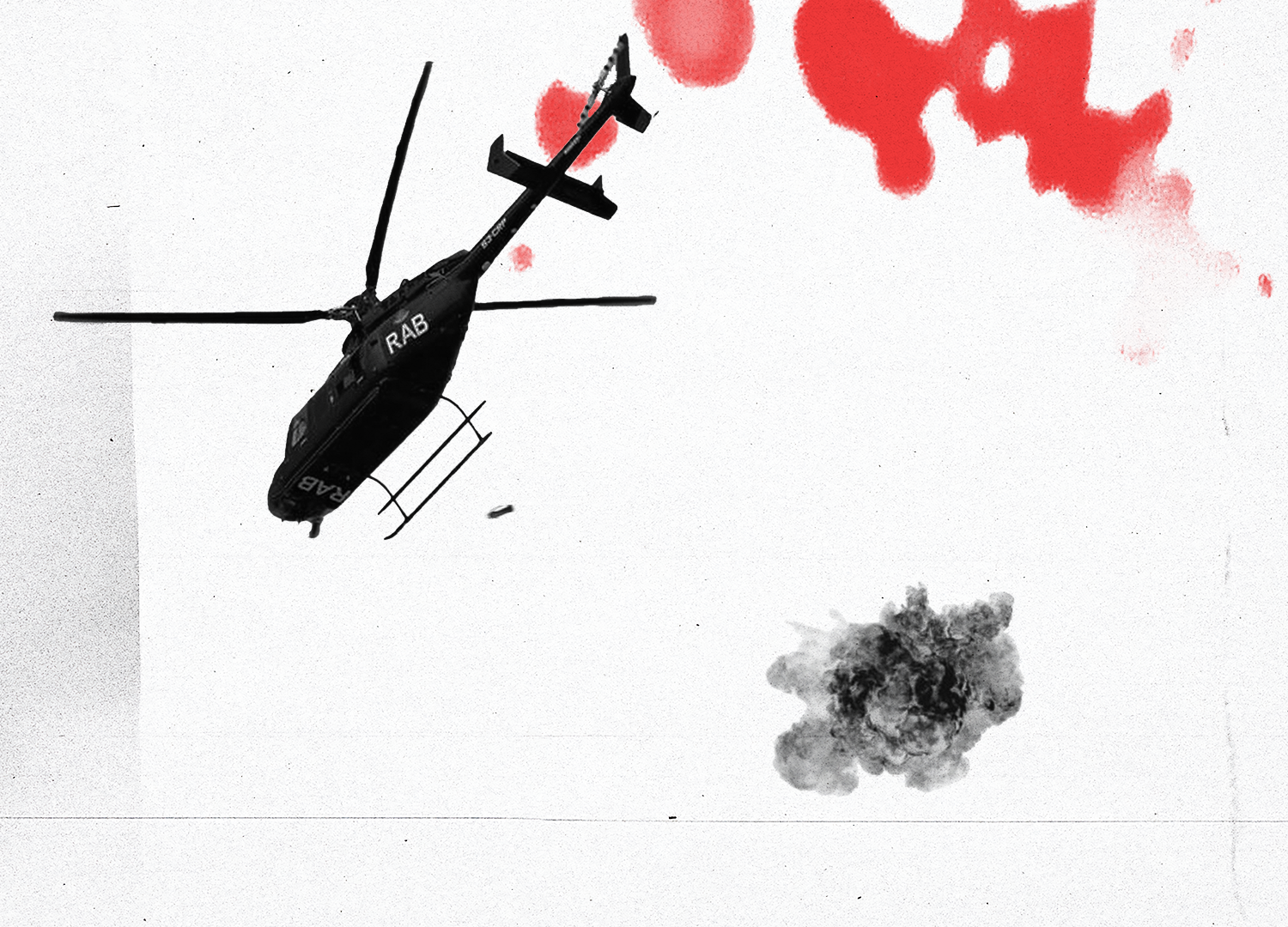
On the sweltering evening of July 19th in Mohammadpur, Dhaka, the bright young life of twelve-year-old Rakib Hasan came to a sudden and tragic end. His still body was captured on video as a group of men carried him through the tumultuous streets towards a nearby hospital. Someone wrapped his head with an Argentine football jersey to slow the rapid loss of blood. “A child, a child,” an onlooker cried out with palpable anguish.
From a rooftop less than half a kilometre away, witnesses recorded a helicopter hovering overhead. Stun grenades rained down from it, flashes slicing through the evening darkness like bolts of lightning. One of these stun grenades may have struck Rakib, acting as a blunt object that led to his death, according to an investigation by Netra News.
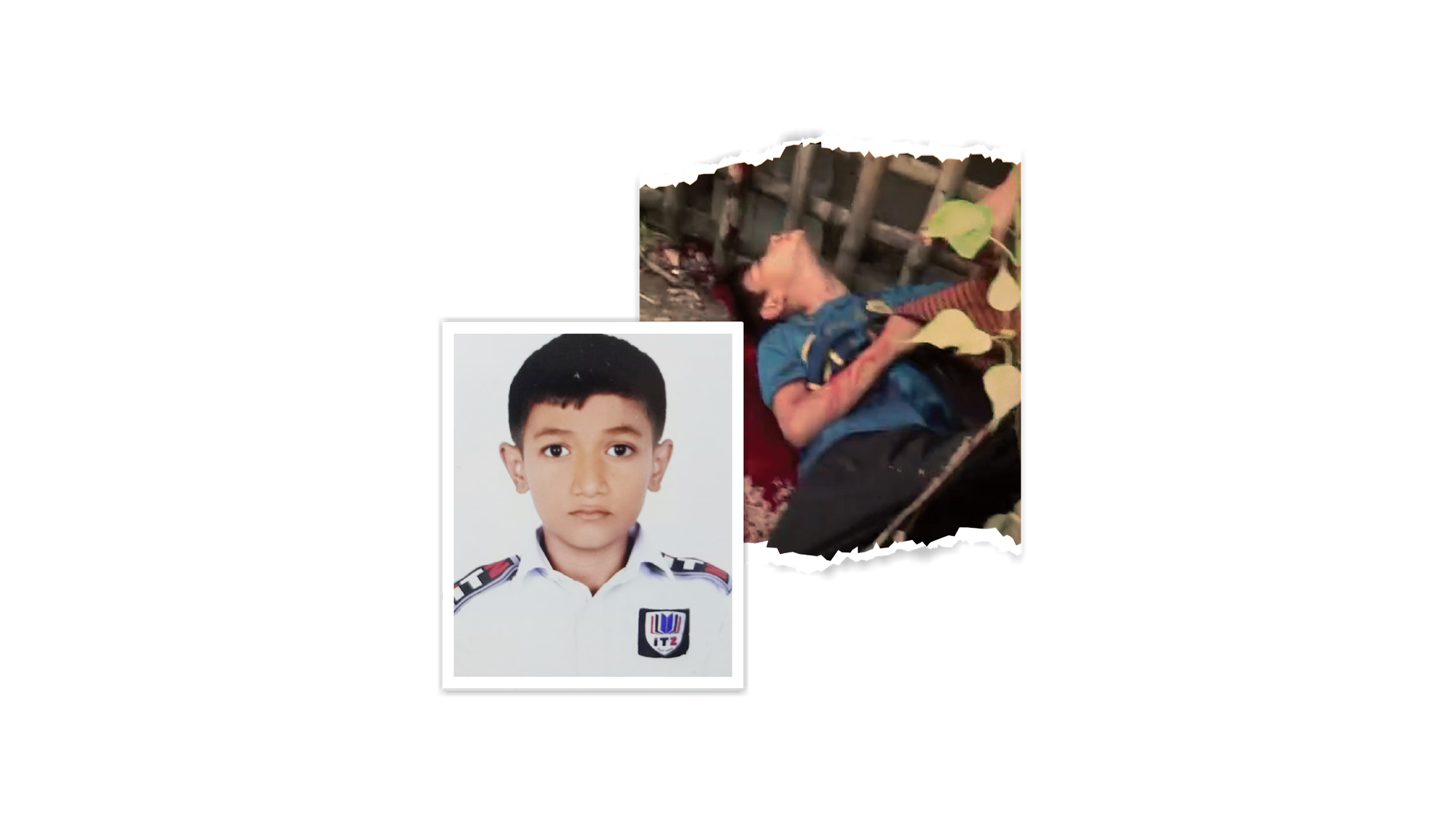
The Rapid Action Battalion (RAB), a military-dominated police unit operating the helicopter, acknowledged using stun grenades for crowd control in Mohammadpur on July 19th, but they strongly denied causing any deaths. However, Rakib’s fate underscores that aerial drops of heavy objects like stun grenades on crowds can be no less deadly.
“There is no role for stun grenades in a protest,” said the Physicians for Human Rights, a Nobel Peace Prize-winning group that extensively studied use of these devices on crowds. “Firing from helicopters or drones can be particularly dangerous.”
Netra News’ investigation linking RAB to Rakib’s death drew from extensive geolocation analysis of videos, medical, forensic and police documents, as well as interviews with officials, forensic experts, eyewitnesses and Rakib’s family.
The investigation has also uncovered that local police initially sought to deter the family from pursuing justice. After a new government took power, promising accountability for such deaths, the police shifted focus, pinning the blame instead on politicians from the fallen Awami League regime. But many of those implicated had little or no control over RAB’s actions that day.
Both the Bangladesh Police and RAB have widely used these devices. Official records indicate procurement bids for over 22,000 stun grenades between 2021 and 2023.
- July 1st, 2024
The student protests began sporadically, initially sparked by opposition to government job quotas.
- July 8th, 2024
Tensions escalated dramatically, fueled by controversial court rulings and inflammatory remarks from senior officials, including Sheikh Hasina.
- July 16th, 2024
By July 16th, the first fatalities were reported. In the ensuing days, casualties mounted, surpassing a hundred.
- July 19th, 2024
As many as 75 people—including many schoolchildren like Rakib—were killed during clashes with security forces.
- July 26th, 2024
Reports of firearms and stun grenades being used from helicopters surfaced in late July.
- August 5th, 2024
By the time the Sheikh Hasina regime was overthrown on August 5th, over 800 people had lost their lives, largely due to excessive force used by government agencies.
Piecing together Rakib’s final moments
Netra News has reconstructed the final moments of Rakib’s life after he was struck.
At 6:38 pm, a video provided by his family captured Rakib lying on the ground, blood seeping from around his head. Netra News geolocated the scene to a spot just a minute’s walk from his home in Mohammadpur.
Within two minutes, a second video verified by Netra News shows people hurriedly carrying his body to the main street. A minute later, a third authenticated video shows a rickshaw being arranged to transport the boy for medical treatment.
Approximately 11 minutes later, at 6:52 pm, eyewitness Salman Naeem—who lives in an apartment half a kilometre from where Rakib was first seen lying on the ground—captured footage of a helicopter firing stun grenades aimed at disorienting protesters on the ground.
Naeem told Netra News that the helicopter first appeared around 6:30 pm and continued firing sound bombs until 7 pm, coinciding with the time when Rakib was hit. “It was repeatedly circling in the air and kept firing,” he said.
Seven days after Rakib was killed, on July 25th, the Rapid Action Battalion (RAB) admitted to deploying stun grenades and teargas canisters from helicopters during protests in Mohammadpur that day, but denied responsibility for multiple other deaths.
Calls to RAB’s phone numbers reserved for the press went unanswered.
Medical records obtained by Netra News show that Rakib was admitted to the National Institute of Neurosciences and Hospital at 7:52 pm, an hour after the rickshaw carrying his body began moving. An admission ticket notes the patient had a “head injury (grenade blast).”
Less than 30 minutes later, around 8:15 pm, doctors declared him dead after performing an electrocardiogram test.
His father, Abul Khair, wished to take his body for burial immediately thereafter. But the boy was transferred to the nearby Shaheed Suhrawardy Medical College and Hospital for an autopsy to determine the cause of death.
Even though the family of the boy had no objection, the hospital authorities declined to provide Netra News with a copy, citing the need for a judicial or law enforcement approval.
Netra News, nonetheless, obtained handwritten notes of a physician involved in the procedure. A doctor familiar with the forensic pathology confirmed the authenticity of the notes when contacted by Netra News but requested anonymity as he was not authorised to speak to the press.
“Death was due to shock as a result of grenade [..] injuries,” the doctor’s note reads. The injuries were “antemortem & homicidal.”
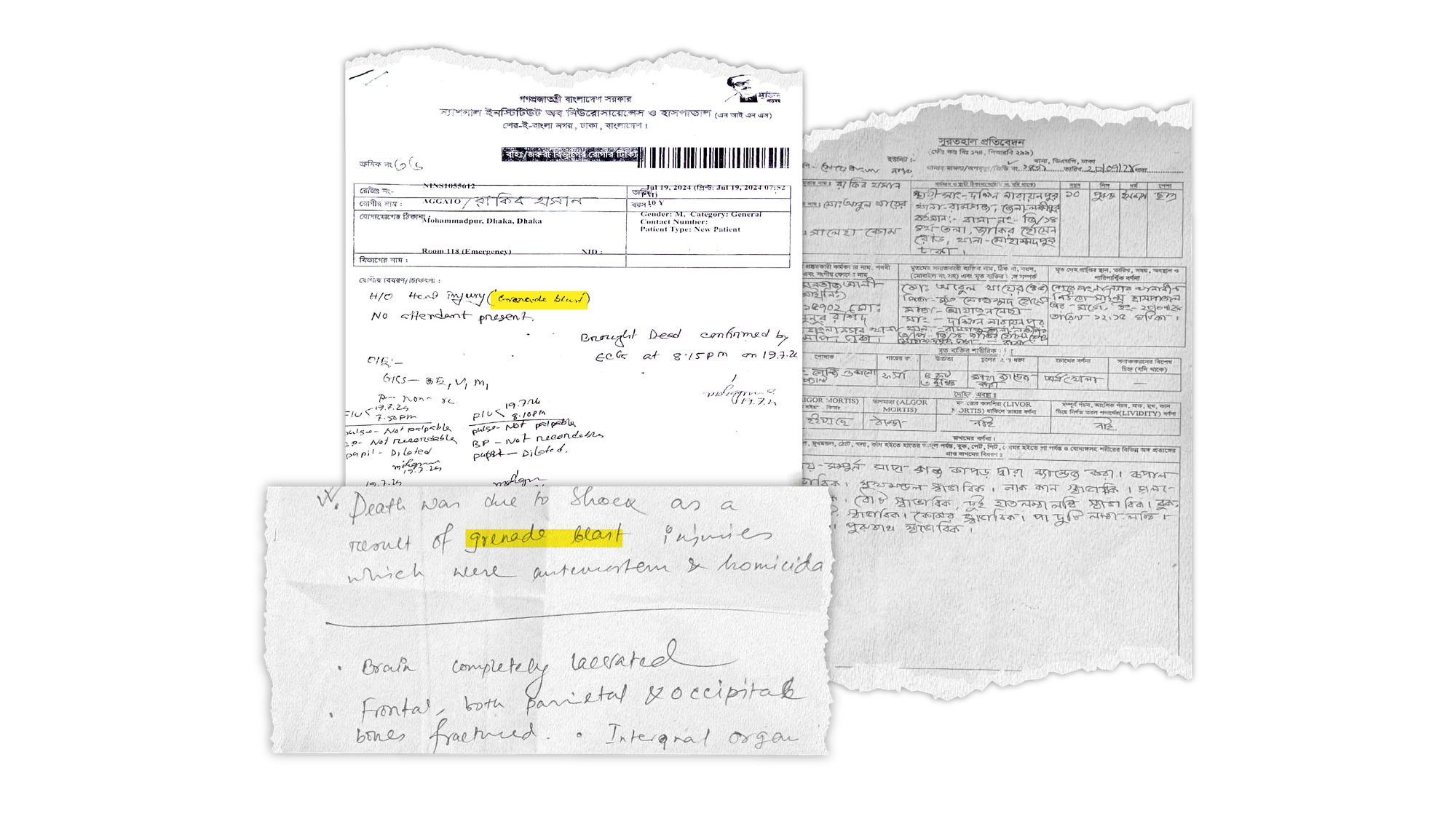
The medical document further noted that Rakib’s brain was “completely lacerated,” leaving a deep cut on the head, with the bones of his skull fractured.
An expert from the Physicians for Human Rights (PHR) said the description of the injury suggests that the stun grenade “falling on his head could do this.”
A Bangladeshi-origin forensic scientist with experience working with the Department of Public Safety in Texas, United States, reviewed the notes and associated findings for Netra News. She agreed that the description was consistent with a blunt object hitting the skull from above.
Separately, Dr. Rohini Haar, a doctor affiliated with the PHR, said, “Stun grenades are known to cause a range of injuries, from burns to blast injuries to traumatic impacts from being directly targeted.”
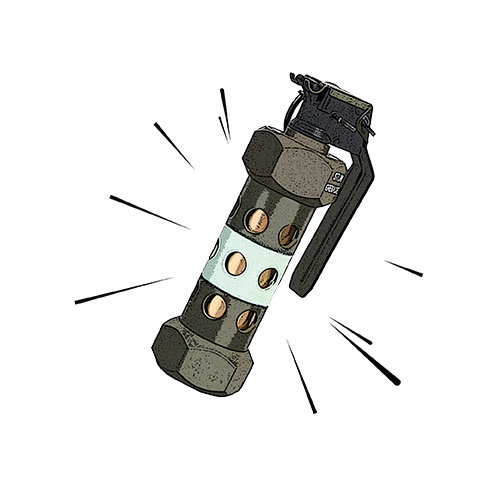
The pathologist’s notes also added that the body contained no other injuries.
Netra News also obtained a copy of the inquest report prepared by the Sher-e-Bangla Nagar Police Station after Rakib’s body was sent from the hospital.
The report noted that external organs, including the forehead, appeared normal, an observation in line with the doctor’s. However, the report avoided describing the head injuries and only mentioned that “the head was fully covered by a white bandage.”
Justice elusive
Abul Khair, Rakib’s father, told Netra News that police at the time forced him to sign a statement before his son’s body was released, forfeiting any right to future legal recourse.
“I am collecting the body on the condition that I shall not seek any form of legal recourse regarding this body in the future,” the statement signed by Khair reads. The statement also mentions a police officer, Sub-Inspector Shafik, who Khair said had compelled him to sign.
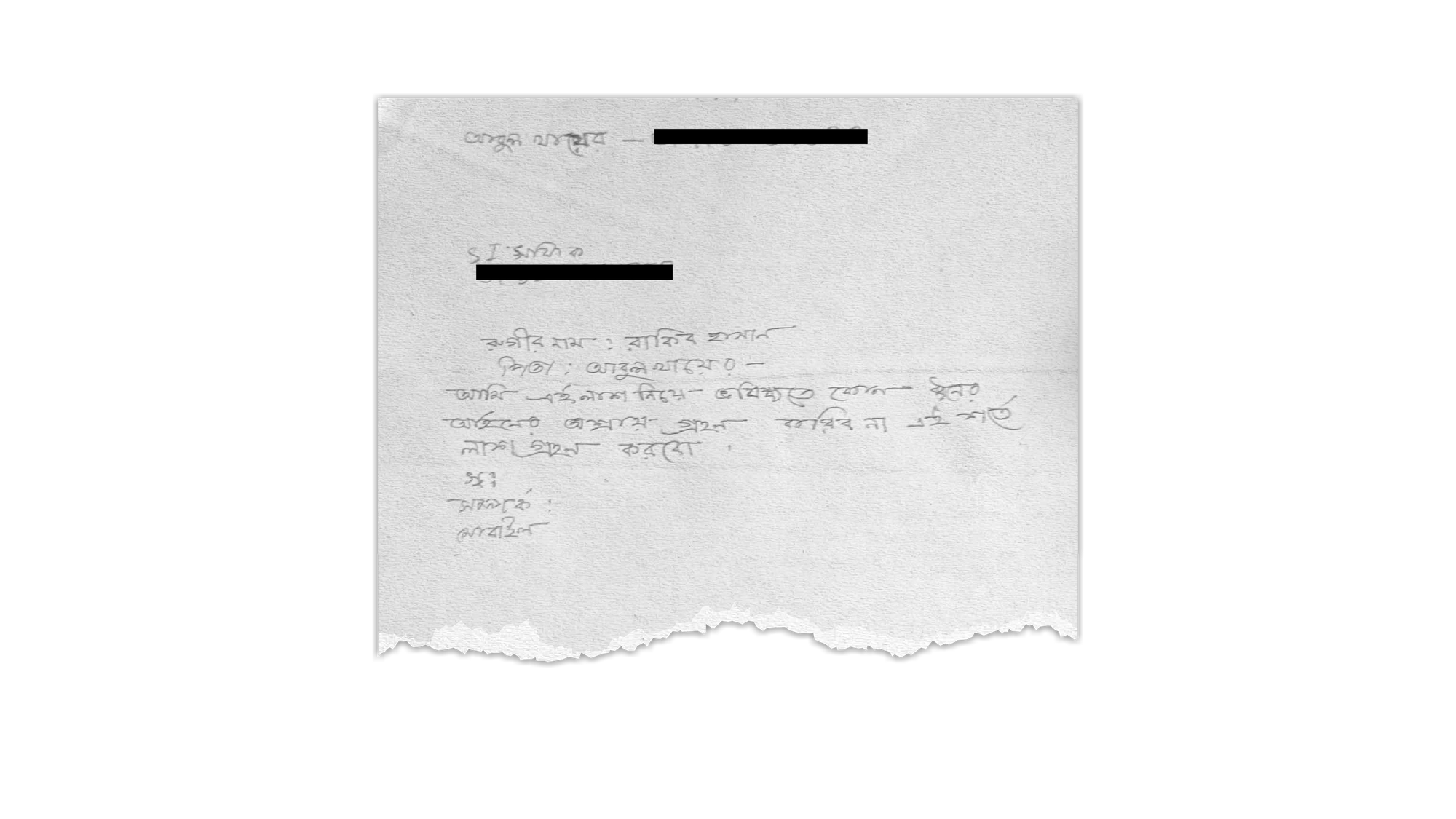
Netra News was unable to locate Shafik, as authorities made sweeping changes in police stations in Dhaka after an interim government took charge following the fall of Sheikh Hasina’s administration.
The new government led by Muhammad Yunus vowed justice for killings like Rakib’s.
News reports suggest one of Rakib’s uncles filed a police complaint regarding his death. A copy of the complaint obtained by Netra News, however, makes no mention of the RAB’s use of stun grenades.
Instead, the vaguely worded allegation accuses numerous members of the Awami League party—from as high as its chief, Sheikh Hasina, to as low as ward-level activists—of being responsible for the death. It also claims a bullet took Rakib’s life, without offering any evidence.
An analyst said that complaints like this are often crafted by partisan lawyers who provide pro bono services to family members.
These lawyers tend to exploit tragic cases to advance their own political interests instead of seeking genuine accountability, he added.
The police are still supposed to investigate the validity of such claims and press appropriate charges. However, on October 17th, they arrested Atiqul Islam in relation to the case. Islam, an Awami League businessman and former Dhaka mayor, had little to no control over RAB’s actions that day and lacked any official authority over the agency.
The arrest suggests that the police, too, may prioritise pursuing political targets than those who pulled the trigger.●
source : netra.news
